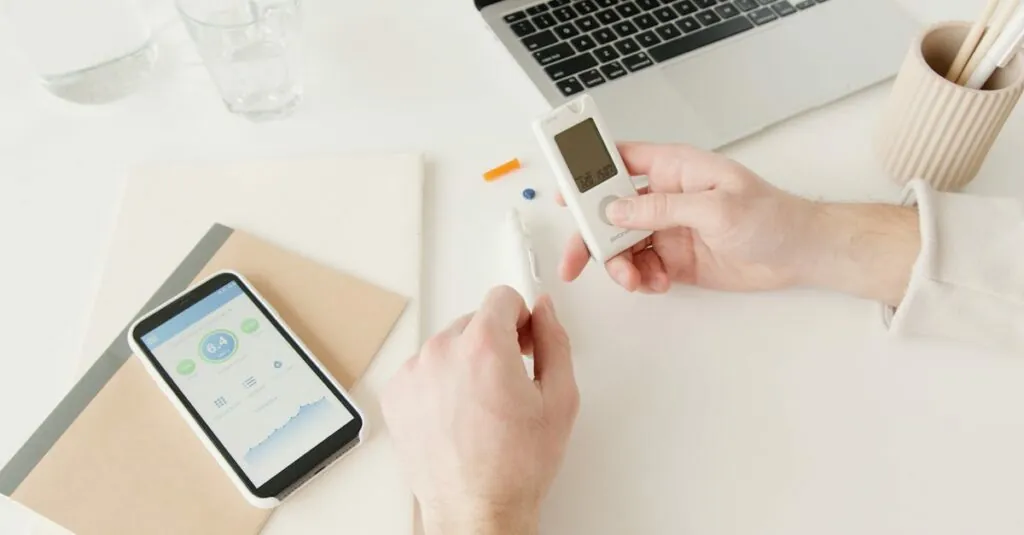Table of Contents
ToggleIn a world where everyone’s glued to their smartphones, it’s no surprise that healthcare’s getting a digital makeover. Mobile apps aren’t just for ordering takeout or scrolling through social media anymore; they’re transforming how people manage their health. Imagine having a personal health assistant right in your pocket, ready to remind you to take your meds or track your steps like a drill sergeant with a fitness obsession.
These apps are more than just convenience; they’re revolutionizing patient care and making healthcare accessible to everyone. From telemedicine to mental health support, mobile apps are like Swiss Army knives for health—versatile, handy, and sometimes even a little quirky. So, if you’re ready to embrace the future of healthcare, buckle up! The ride’s about to get a whole lot smoother with the right mobile app by your side.
Overview Of Mobile Apps For Healthcare
Mobile apps serve a crucial role in the healthcare ecosystem. These applications facilitate communication between patients and healthcare providers. Numerous functionalities exist including appointment scheduling, medical record access, and health tracking.
Health monitoring apps provide tools for individuals to track vital statistics like blood pressure, glucose levels, and physical activity. Users benefit from features such as personalized alerts for medication and fitness goals. Telemedicine platforms enable remote consultations, enhancing convenience and accessibility.
Mental health apps offer resources for managing stress, anxiety, and depression. These platforms often include guided meditation, symptom tracking, and virtual therapy sessions. By integrating resources, mobile apps contribute to improved mental well-being.
Research indicates that mobile app usage in healthcare increases patient engagement. Various studies highlight that patients using health apps report better adherence to treatment plans. Access to real-time data promotes informed decision-making and proactive health management.
Security remains a top priority when utilizing mobile health applications. Regulatory standards like HIPAA ensure that patient information is protected. Developers must prioritize privacy features in their apps to meet these regulations.
Overall, mobile apps for healthcare enhance patient experiences significantly. As technology continues to advance, these tools evolve, becoming indispensable in everyday health management. Future trends indicate an increasing reliance on mobile solutions to streamline healthcare delivery across various platforms.
Types Of Mobile Apps For Healthcare
Mobile apps in healthcare encompass various types, each serving essential functions that enhance patient care and promote wellness. The most notable categories include telemedicine apps, health tracking apps, and medication management apps.
Telemedicine Apps
Telemedicine apps bridge the gap between healthcare providers and patients. Users can engage in virtual consultations, reducing the need for physical visits. These platforms often facilitate real-time video chats, ensuring convenience for those in remote areas. Additionally, many telemedicine apps integrate appointment scheduling and secure messaging, simplifying communication. Evidence shows that over 75% of patients express satisfaction with remote consultations, highlighting the effectiveness of these tools in modern healthcare.
Health Tracking Apps
Health tracking apps empower individuals to monitor their wellness metrics. These applications often track vital statistics, such as heart rate, sleep patterns, and activity levels. Customizable alerts remind users to stay active or adhere to fitness goals. Users benefit from graphical representations of their data, making pattern recognition easier. Research indicates that consistent use of health tracking apps can lead to a significant improvement in overall health outcomes, demonstrating their value in preventive care.
Medication Management Apps
Medication management apps assist individuals in adhering to prescribed regimens. Users can receive timely reminders for their medications, reducing the likelihood of missed doses. These apps often include features for tracking prescription refills and storing medication information securely. By providing drug interaction alerts, these applications enhance patient safety. Studies suggest that patients using medication management apps adhere to their treatment plans more effectively, ultimately contributing to better health management.
Benefits Of Mobile Apps For Healthcare
Mobile apps significantly enhance healthcare services. Their integration fosters better patient care and improved health outcomes.
Improved Patient Engagement
Mobile apps actively increase patient involvement in their health management. Providing tools for tracking health metrics, these applications empower users to monitor progress toward their health goals. Analytics show that consistent use of these platforms leads to higher adherence rates for treatment plans. Patients gain instant access to educational resources, reinforcing their knowledge about conditions and treatments. Improved engagement results also from features like reminders for medication and follow-up appointments, ensuring users stay connected with their health journeys.
Enhanced Accessibility
Healthcare apps broaden access to medical services. Users can receive telehealth consultations regardless of geographical locations, drastically reducing barriers. Studies demonstrate that telemedicine increases access for those in rural areas or with mobility challenges. Mobile applications cater to diverse patient needs, including mental health support through immediate resources and guidance. Quick access to medical records and lab results fosters transparency, encouraging proactive health management.
Streamlined Communication
Mobile apps simplify communication between patients and providers. Users benefit from secure messaging options, ensuring personalized interactions with healthcare teams. Appointment scheduling becomes more efficient, reducing wait times and improving the overall patient experience. Notifications for test results and urgent messages keep patients informed in real time. Effective communication enhances trust, allowing healthcare providers to respond promptly to patient concerns and inquiries. Overall, streamlined communication through apps promotes cohesive care and strengthens relationships within the healthcare system.
Challenges And Considerations
Mobile apps for healthcare face several challenges that must be addressed for optimal effectiveness. Data privacy and security remain paramount, as users share sensitive health information. Compliance with regulations like HIPAA safeguards this data through encryption and secure access protocols. Healthcare providers must ensure that personal information remains confidential to build trust among users.
User adoption barriers also affect the widespread use of these apps. Some individuals may lack familiarity with technology, while others may feel overwhelmed by the available options. Clear instructions and user-friendly interfaces can help mitigate these obstacles. Research shows that targeted education significantly enhances adoption rates, allowing users to experience the full benefits of mobile healthcare applications. Ensuring that apps cater to diverse demographics promotes a smoother transition and wider usage.
Future Trends In Mobile Apps For Healthcare
In the evolving landscape of mobile healthcare apps, artificial intelligence (AI) emerges as a key driver. AI algorithms enhance personalized care by analyzing user data, predicting health issues, and recommending preventive measures. Health organizations increasingly adopt AI-based diagnostic tools, streamlining clinical decision-making.
Wearable devices gain traction, encouraging users to track real-time health metrics. Integration with mobile apps allows for continuous monitoring of vital signs, leading to proactive health management. Examples include heart rate monitors and glucose trackers, which provide critical insights into individual health.
Telehealth remains pivotal, with virtual consultations becoming standard practice. Enhanced video conferencing technology enables providers to reach remote patients effectively. Innovations in telehealth platforms streamline access to specialists, improving referral processes and patient outcomes.
Data security advances alongside mobile app development. User trust hinges on robust data protection measures; therefore, healthcare apps focus on implementing cutting-edge encryption methods. Compliance with HIPAA regulations safeguards sensitive health information, fostering a secure user environment.
Interoperability becomes essential, allowing different healthcare systems and apps to communicate seamlessly. Integration with electronic health records (EHR) leads to more coordinated care and informed decision-making. Patients benefit from having all relevant information consolidated, creating a holistic view of their health.
Mental health applications continue to expand, addressing the growing demand for accessible support. Many individuals seek immediate resources for managing stress or anxiety, leading to an increase in app users. Platforms that offer guided meditation, therapy chat options, and self-assessment tools prove particularly valuable.
As mobile apps become integral to healthcare, user-friendly designs emerge as a priority. Simplified interfaces enhance navigation, particularly for older adults or those less tech-savvy. Targeted education initiatives can bridge knowledge gaps and foster broader app adoption.
Mobile apps are reshaping the healthcare landscape by enhancing accessibility and personalizing patient care. As technology continues to advance, these applications will play an increasingly vital role in managing health and wellness. With features that promote communication between patients and providers and tools that empower users to track their health metrics, mobile apps are becoming indispensable.
The emphasis on data security and user-friendly designs ensures that patients can engage confidently with their health information. As the integration of AI and wearable technology grows, the potential for improved health outcomes becomes even more promising. Embracing mobile health solutions is essential for navigating the future of healthcare effectively.



